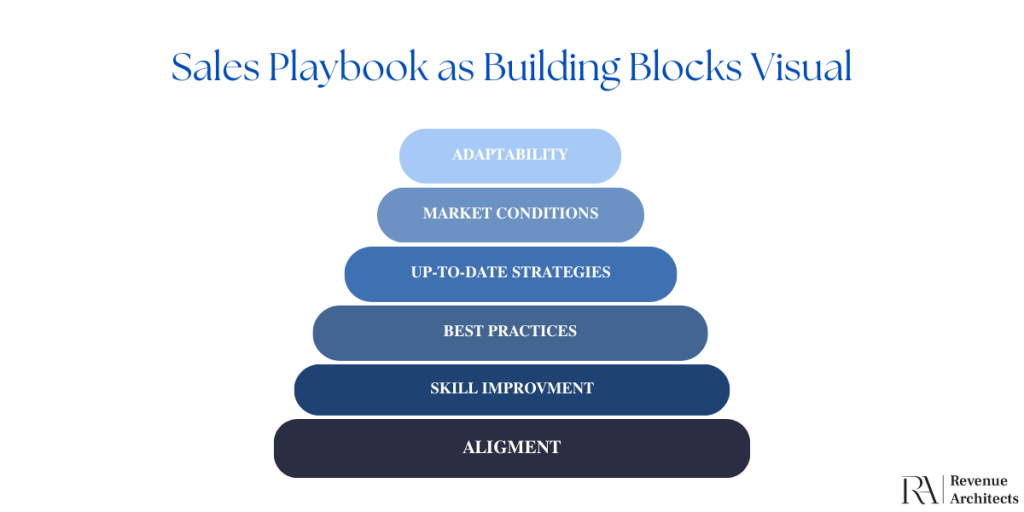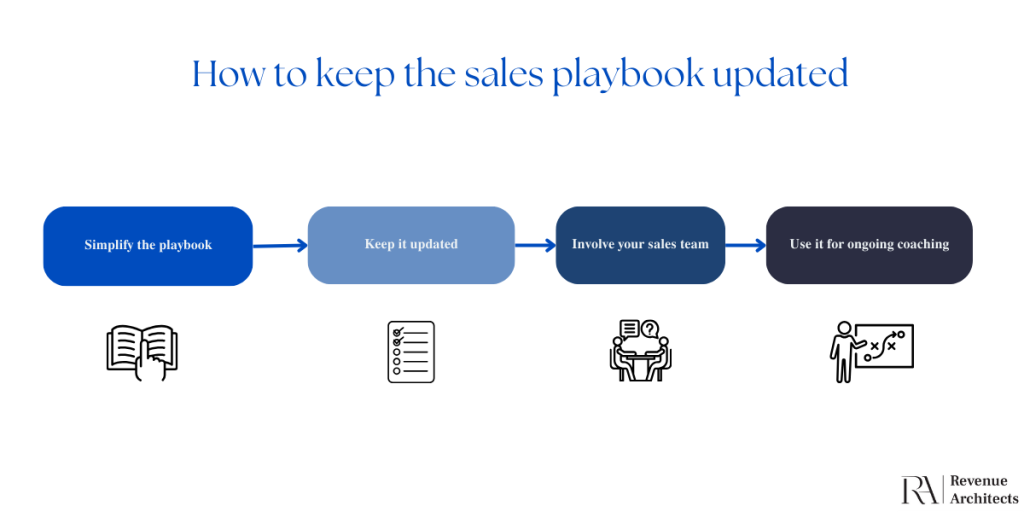A sales playbook is essential for any sales team striving for consistent success. It is a strategic guide that equips your team with the knowledge, processes, and tactics to close deals efficiently. In this article, we’ll explore why every team needs a sales playbook, the critical elements of a successful playbook, and how to create one that boosts performance while avoiding common pitfalls.
Why Every Team Needs a Sales Playbook
A sales playbook is more than just a manual—it’s a comprehensive guide that aligns your sales team’s efforts, improves their skills, and enhances their overall performance. Without a playbook, sales reps rely on intuition or inconsistent methods, leading to missed opportunities and conflicting results. A well-crafted sales playbook helps standardize the approach, ensuring that every sales professional follows proven tactics that have been refined over time.

Sales playbooks are particularly important because they quickly bring new team members up to speed, reducing the learning curve. Instead of figuring out sales strategies independently, new reps can immediately tap into a resource that outlines the best practices, common objections, and winning approaches your team uses. This minimizes errors and enhances team cohesion, as everyone is aligned on the same goals and methods.
Moreover, a sales playbook provides a clear structure that can adapt as your market changes. For instance, when new products, competitors, or market conditions arise, the playbook can be updated to include new objection-handling techniques, competitive analysis, and case studies. This ensures your team always has the latest strategies.
This adaptability is crucial in fast-paced environments, where the ability to pivot quickly can make the difference between winning and losing a deal. Ultimately, a sales playbook empowers your team to perform at their best, driving consistent results and boosting overall sales effectiveness.
Critical Elements
Creating a successful sales playbook involves more than just compiling random sales tips and scripts. A well-structured playbook should cover several key elements that guide sales reps through the entire sales process. The first critical element is your sales methodology. This section outlines your team’s overall approach to selling, whether it’s solution selling, consultative selling, or another proven method. Defining this upfront helps ensure your team understands the foundational principles guiding their interactions with prospects.
Another essential component is the buyer persona section. By detailing your ideal customer profiles, your sales team can better understand who they are selling to, what pain points they should address, and how to tailor their pitches accordingly. This section should include demographic details, common challenges, and buying behaviors of your target audience. When your sales team understands their audience deeply, they can craft more compelling messages that resonate with potential buyers.
The playbook should also feature step-by-step sales processes that outline each sales funnel stage, from lead generation to closing deals. Each stage should be supported by specific strategies, scripts, and checklists that guide reps in moving prospects closer to a purchase. Additionally, objection-handling techniques, competitive analysis, and case studies provide your team with valuable resources to tackle challenges and differentiate your offerings from competitors.
Lastly, KPIs (Key Performance Indicators) should be included to help measure the effectiveness of each stage of the sales process. Setting clear metrics helps your team understand what success looks like and allows them to track their progress toward meeting individual and team goals. KPIs such as conversion rates, average deal size, and sales cycle length can provide valuable insights into the performance of your sales strategies. By incorporating these key elements, your sales playbook becomes a powerful tool that drives consistent and scalable sales success.
How a Sales Playbook Boosts Team Performance
A well-designed sales playbook profoundly impacts team performance, serving as a critical tool for driving sales efficiency and effectiveness. It boosts performance by providing clear guidelines and best practices that minimize guesswork and streamline the sales process. Sales reps don’t need to reinvent the wheel with each new prospect; instead, they can rely on proven strategies that have been documented and tested over time.
The sales playbook brings consistency, ensuring that every team member, whether new or experienced, approaches the sales process with professionalism and knowledge. This unified approach helps build a consistent customer experience where prospects receive high-quality interaction at every touchpoint. This consistency boosts conversion rates and builds trust with potential customers as they recognize your team’s confidence and expertise.

Furthermore, sales playbooks can significantly reduce onboarding time for new sales reps. Rather than spending weeks or months learning the ropes through trial and error, new hires can quickly get up to speed by following the playbook’s structured guidance. This accelerates their ability to contribute to the team’s goals and reduces the overall ramp-up time. Additionally, having a clear set of processes and benchmarks enables managers to provide more targeted coaching, helping reps address specific areas for improvement.
Sales playbooks also play a crucial role in fostering continuous learning and adaptation. As the market evolves, the playbook can be updated to reflect new trends, competitor moves, and changes in customer behavior. This ensures your team is always equipped with the latest information and strategies, keeping them one step ahead of the competition. Ultimately, a sales playbook is an invaluable resource that enhances team performance by providing structure, reducing variability, and promoting ongoing growth.
Step-by-Step Guide to Building a Sales Playbook
Building a sales playbook doesn’t have to be daunting. Following a step-by-step approach, you can create a comprehensive guide that empowers your sales team and drives results. Start by defining the purpose of your playbook. What specific challenges are you trying to address? Whether improving conversion rates, reducing onboarding time, or standardizing your sales process, having a clear objective will guide the entire development process.
Next, gather input from your top-performing sales reps and sales managers. They have firsthand experience with what works and what doesn’t, making them invaluable resources for creating the content of your playbook. Their insights can help you understand the challenges they face, the strategies they use to overcome them, and the best practices they follow. Conduct interviews, surveys, and brainstorming sessions to collect their insights, which will help you build realistic and actionable strategies.
Once you have the foundational content, structure your playbook into sections that reflect the different stages of your sales process. Include detailed descriptions of each stage, along with actionable tips, scripts, and examples that guide your team on how to move prospects forward. It’s essential to use clear and concise language that’s easy to understand and follow. Avoid jargon and focus on practical advice that can be implemented right away.
After completing the draft:
- Test your playbook with a small group of sales reps to gather feedback.
- Pay close attention to what works well and what needs refinement.
- Use this feedback to make necessary adjustments, ensuring the playbook is user-friendly and practical.
- Implement the playbook across your entire team and provide ongoing training to ensure everyone understands how to use it.
- Remember, the playbook is a living document—update it regularly to keep it relevant and aligned with your team’s evolving needs.
Common Sales Playbook Mistakes (and How to Avoid Them)
Creating a sales playbook can significantly enhance your team’s performance, but it’s easy to fall into common traps that can undermine its effectiveness. One of the most prevalent mistakes is overcomplicating the content. Sales playbooks should be clear and concise, providing straightforward guidance rather than overwhelming your team with information. Avoid including unnecessary details that could distract from the core strategies your reps need to succeed.
Another common pitfall is failing to keep the playbook updated. The sales landscape constantly evolves, and your playbook needs to reflect these changes. Outdated strategies, scripts, or market information can lead to missed opportunities and decrease the credibility of your playbook. Set a regular review schedule to keep the content fresh, relevant, and aligned with current market conditions.
Another critical error is involving your sales team in the creation process. A playbook that doesn’t consider the input of those on the front lines is likely to miss the mark. Involving your sales reps in the development process ensures that the content is practical and increases buy-in from the team, as they feel a sense of ownership over the playbook.
Lastly, a common mistake is not using the playbook as a training and coaching tool. Simply distributing the playbook isn’t enough—it must be integrated into your team’s regular training and coaching sessions. Use the playbook as a reference point during sales meetings, role-plays, and one-on-one coaching to reinforce best practices and keep your team aligned.

Keeping it Updated and Effective
To maintain effectiveness, a sales playbook must be continuously updated to reflect new market realities, strategies, and team feedback. Start by establishing a review process that involves regular input from your sales team. Encourage reps to share what’s working, what’s not, and any new objections or challenges they are encountering in the field. This real-time feedback is invaluable for keeping the playbook relevant and effective.
Another critical strategy is to analyze sales performance data to identify areas where the playbook could be improved. Metrics such as conversion rates, deal velocity, and win-loss ratios can provide insights into which strategies are working and which need adjustment. Use these insights to refine your playbook’s content, ensuring it consistently drives the desired outcomes.
Incorporating new market trends and competitive insights is also crucial. Your sales strategies must adapt as new competitors emerge and customer preferences evolve. Regularly update the playbook with new messaging, competitive differentiators, and product updates to ensure your team is always equipped with the latest tools for success.
Finally, foster a culture of continuous learning within your team. Encourage reps to see the playbook as a dynamic resource that evolves with their needs. Regular training sessions, workshops, and team discussions can reinforce the playbook’s value and keep everyone aligned on its latest updates. Making these practices part of your routine ensures that your sales playbook remains a powerful and effective tool that drives consistent results.
In Conclusion
Creating a winning sales playbook requires thoughtful planning, collaboration, and ongoing refinement. By focusing on the correct elements, avoiding common mistakes, and continuously updating your playbook, you can equip your sales team with the tools they need to thrive.
Commit this to memory: A well-crafted sales playbook enhances individual performance and fosters a cohesive, high-performing team that consistently delivers results. However, creating and maintaining a robust sales playbook requires expertise, strategic insight, and a deep understanding of the factors that contribute to sales success.
As a team of seasoned sales coaches, we specialize in helping organizations like yours craft customized playbooks that reflect your unique sales process and unlock your team’s full potential. Our expertise lies in empowering sales teams with strategies that drive success and close more deals, tailored to your specific needs.
If you’re ready to elevate your sales performance and equip your team with the tools they need to thrive, let’s connect. Schedule a call with us today to explore how we can help you create a winning sales playbook that delivers consistent results and sets your team up for long-term success.

